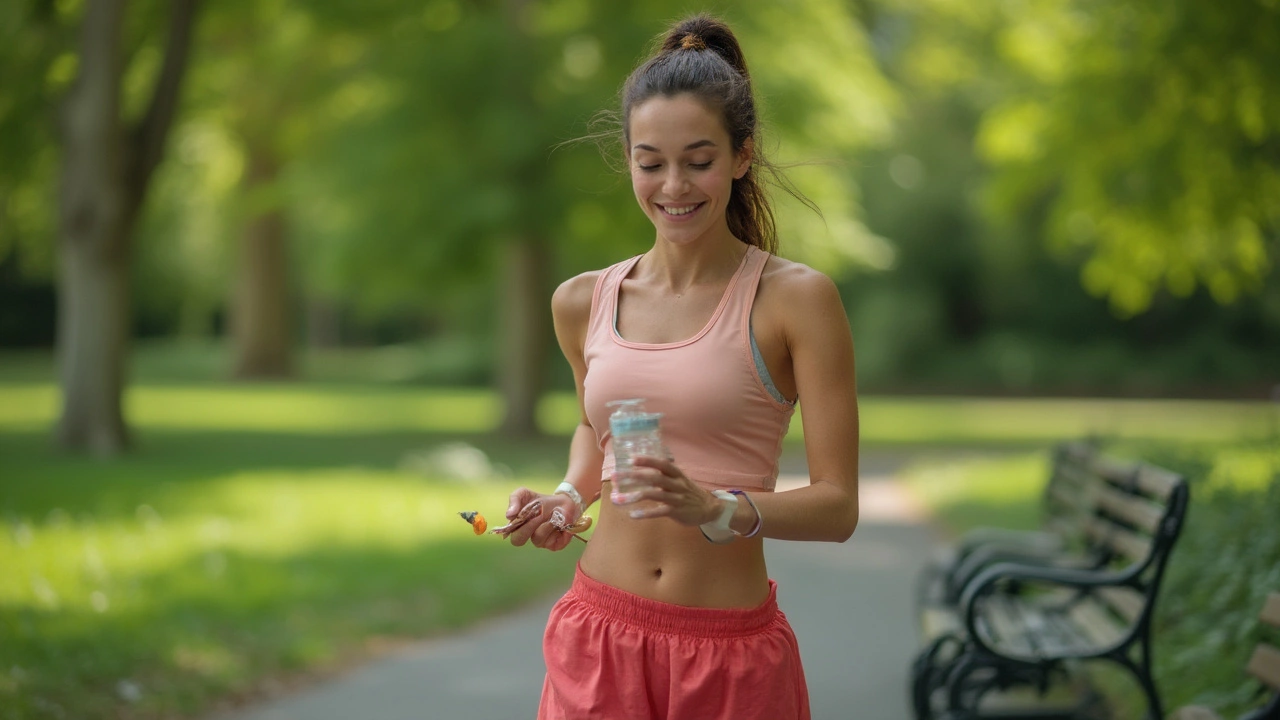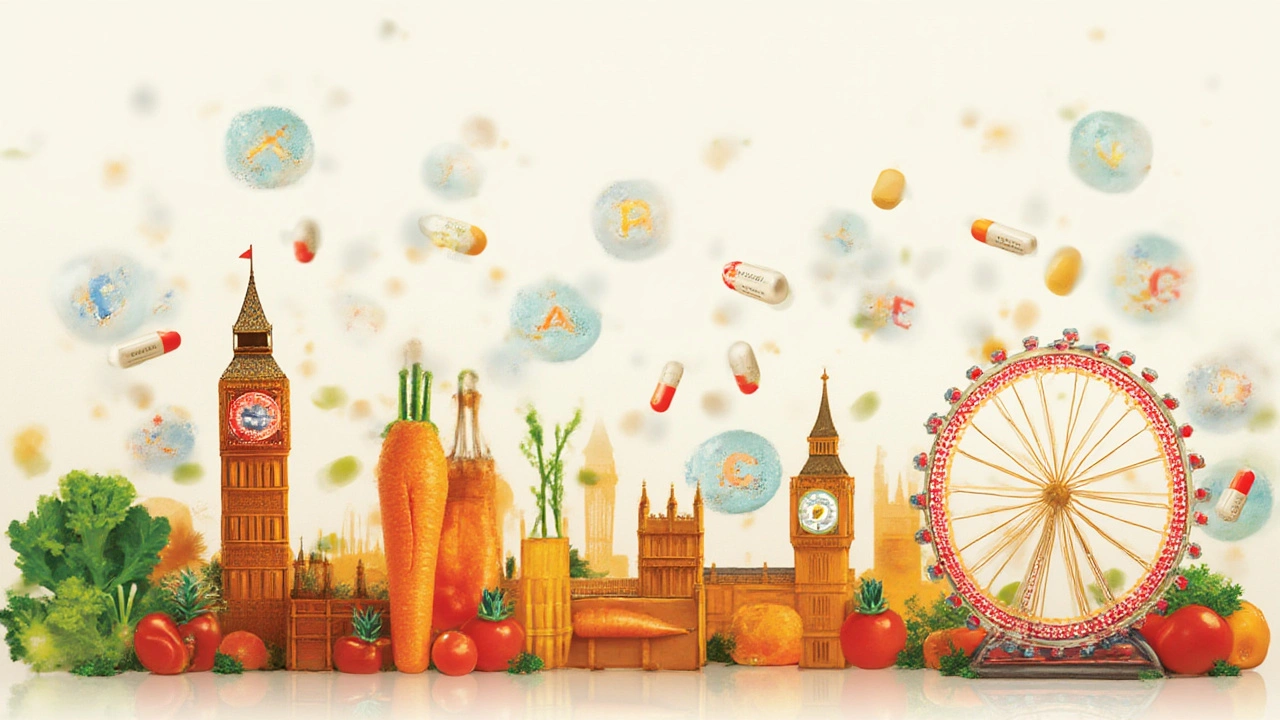
Felix once asked if 'vitamins are magic.' Watching Isla toss broccoli onto the floor, I wondered the same. You know what's wild? Scientists first discovered vitamins barely more than a century ago. Before that, people just got sick and nobody knew that they were missing tiny things their bodies needed.
Why Your Body Craves Vitamins
Let’s get real. Our bodies are engines, but not diesel or petrol ones. They need vitamins like B12, D, and C to keep running smoothly. Why? Each vitamin does a crazy-important job. Vitamin C keeps your skin and immune system strong. Miss it and, historically, sailors got bleeding gums and scurvy. B12 helps make new blood, keeps your nerves firing, and without it? You’ll feel like a zombie with brain fog. Vitamin D? Your bones and immune system rely on it, and almost all the folks up north are low during winter since we just don’t get enough sun. Crazy, right, that sunlight becomes a vitamin factory for your body?
It’s tempting to brush off vitamins as boring, but they work behind the scenes every second you’re alive. Even slight shortages can mess with your mood, energy, sleep, and more. Kids and teens need plenty just to grow and think clearly, and grown-ups burn through extra when stressed, sick, or exercising a lot. Not getting enough may leave you feeling sluggish, down, or sick more often.
Check this out—according to a study in The American Journal of Clinical Nutrition (2023), nearly 14% of adults in the UK are vitamin D deficient by springtime. That shoots up in older adults. Turns out, life indoors, work, and clouds don’t exactly help our vitamin needs.
The Science Behind the „Simple” in Simple Vitamins
Take a handful of spinach. Looks simple? It’s loaded with vitamin K, needed for blood to clot. Carrots serve up beta-carotene for vitamin A, saving your eyesight. But here’s where things get interesting: Our bodies can’t make most vitamins themselves. You can only get them from food or, in some cases, from sunlight.
Some are fat-soluble (A, D, E, K) which means you need a little bit of fat in your meal to absorb them. Others are water-soluble (B and C) and flush out quickly. That’s why you’ve got to get some every day—your body doesn’t store them up for a rainy day.
Skipping out on just one vitamin isn’t like skipping homework. It can mean missing out on energy, getting sick more easily, or even bigger issues as time goes on. For example, folic acid is vital for pregnancy because it prevents neural tube defects. The NHS and CDC both say it’s so crucial, that they recommend supplements for women trying to conceive.
- Vitamin D: Critical for bones and mood; synthesize from sun, or find it in fatty fish, fortified dairy, and egg yolks.
- Vitamin C: Famous for immune-boosting, you’ll get loads from oranges, peppers, or strawberries.
- Vitamin B12: Only comes from animal foods or fortified plant milks and cereals. Essential if you’re vegetarian or vegan.
- Vitamin A: Best for vision, from carrots, sweet potato, and leafy greens.
- Vitamin K: Get it from leafy greens—without it, even small cuts would keep bleeding!

Spotting Vitamin Gaps and Fixing Them
Ever had a day where you felt off—tired, cranky, struggling to focus—but slept just fine? It might not be stress. Sometimes, it’s a sign you’re low on one or more vitamins.
The trick is not to panic but to pay attention. Here are some common red flags:
- Mouth ulcers or cracks at corners? Possible B-vitamin shortage.
- Dry skin, brittle hair? Could be low in biotin or vitamin C.
- Muscle cramps? Check your magnesium, calcium, or vitamin D intake.
- Feeling blue in winter? Vitamin D deficiency is notorious for this.
Doctors can check your vitamin levels with simple blood tests. But even without tests, you can spot patterns. If you’re eating junk food or skipping meals, you’re probably not getting everything you need. My go-to: make sure half your plate is veggies or fruit, lean into whole grains, eat a little fat (olive oil, nuts), and don’t forget about colorful foods. Colors = nutrients.
When diets aren’t enough or you’re at risk—like being vegetarian, vegan, pregnant, elderly, or living in northern countries—supplements come in handy. But don’t just grab the strongest bottle on the shelf. You want the dose that fits your age, health, and lifestyle. Too much vitamin A, for example, can be dangerous, especially for kids or pregnant women.
| Vitamin | RDA | Top Food Sources |
|---|---|---|
| Vitamin D | 10 mcg | Fatty fish, egg yolk, fortified cereals |
| Vitamin C | 40 mg | Peppers, oranges, strawberries |
| Vitamin B12 | 1.5 mcg | Meat, fish, dairy, fortified products |
| Vitamin A | 700/600 mcg (M/F) | Carrots, sweet potatoes, spinach |
| Vitamin K | 1 mcg/kg | Leafy greens, broccoli, soybeans |
Smart and Simple Ways to Get More Vitamins
Parents know the challenge—kids often reject anything green. Felix likes his food beige, Isla thinks tomatoes are toys. So, here’s how to sneak more vitamins in without fuss. Blend vegetables into pasta sauces or curries. Swap white bread for wholegrain. Hand over fruit as snacks instead of just biscuits. For grown-ups, load up on rainbow salads, keep tins of beans or fish in the cupboard, and say yes to a handful of nuts between meals.
Another trick—batch cook. Make a veggie-packed stew or soup and freeze portions. Smoothies aren’t just for gym goers; they’re an easy way to pack in kale, spinach, berries, and seeds all in one hit.
If you work odd hours, travel a lot, or just plain forget, set a reminder on your phone to take a multivitamin. Don’t play doctor yourself though—read the label, stick to recommended doses, and talk to your GP if you have long-term health conditions or take medications.
Label reading matters. Multivitamins are not always created equal. Some brands cut corners or use fillers. Look for UK-registered products, vegan formulations if plant-based, or products with tested purity marks. Steer clear of anything claiming ‘miracle cures’—science doesn’t back the hype.
When it comes to supplements for kids, always go age-appropriate. The gummy vitamins might look like sweets, but they pack a punch—too much iron or vitamin A can be harmful if kids binge on them.

Big Benefits You’ll Actually Notice
Now, this isn’t a fad diet or detox—when you get the right vitamins, you can feel a difference. People often say they have more energy, their skin clears up, sleep improves, and they get fewer bugs. Science backs this up. For instance, the British Nutrition Foundation reported that vitamin C intake directly links to fewer cold days per year and faster recovery if you get sick. Vitamin D shows big benefits for bone density, especially in kids and adults over 60. B12 zaps tiredness and keeps your nerves humming, which is why vegetarians often notice a boost when they start supplementing.
Better vitamins = better mood. There’s a reason the Nordic countries started fortifying foods with vitamin D. Rates of depression dropped when deficiency rates came down. Kids getting enough vitamins grow and learn faster. Older adults staying topped up have fewer falls, sharper memory, and fewer infections.
It’s not just about sickness or energy. Vitamins help your body handle stress, heal wounds, and fight off pollutants in the environment. They keep your immune system in top shape and even play a part in things like eyesight, hearing, and your sense of balance—all stuff you only miss when it starts to fail.
No magic, just science. The big win: most vitamin boosts are free or cheap. Eat smart, spend less time at the doctor, and squeeze out a little more joy from each day. And if your own Isla refuses broccoli again, you know you’ve still got tricks up your sleeve.
